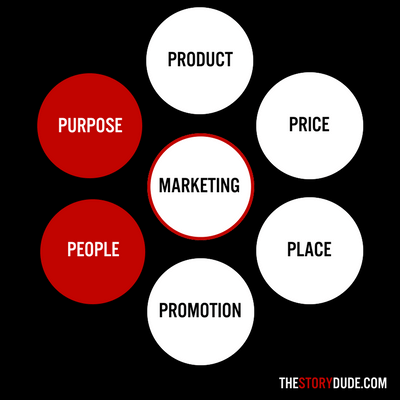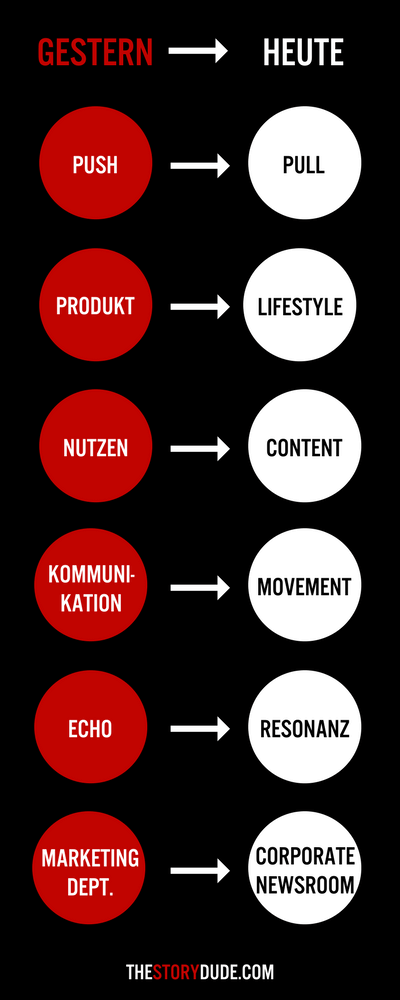Every ABC student in elementary marketing school learns on the first day of his or her career what the neat marketing cloverleaf consists of: Product, Price, Place, Promotion. If you tug on one, you change everything.
That was once upon a time. The marketing circle has grown, namely: Hooray, twins! And that changes everything.
Yes, the old sales management thinking of domination still persists in our heads, textbooks and marketing rooms, because what we know, we do over and over again until someone cries. Even when even those who don't admit it can sense that something is no longer working at all.
Everything remains different.
People no longer do what we want them to do - that is, buy after they have seen advertising. Probably also because they haven't seen any advertising and in the vast majority of cases, and in the best cases, they don't give a shit about the advertising they have seen.
I read in an international study that so-called consumers consider around 74 percent of all brands to be superfluous. When you consider that over 570 billion dollars are invested annually in advertising spend alone, some say it's even double that, then we should think about whether what we're doing is as absolutely right as it's claimed to be. And as it probably used to be, back in the days when William Procter & James Gamble were still ploughing furrows in the dewy consumer field with their own hands.
Product, Price, Place, Promotion. Buy me!
The world has twisted us a few times since then, and now we sometimes have our backs to the wall, but at the same time we see things quite clearly, and not just since today.
The end users or consumers (fka people) have not become hostile to consumption at all. However, consumption is much less of a narcotic than it used to be. Nevertheless, people are constantly googling (fka searching) for products, brands, tests and user reports. And they talk, post and write about them - rate, unbox and recommend, or don't recommend.
Content is king. And Queen.
Most people even want brand content and are looking for it, but at the same time say that 60 percent of the content offered is completely worthless to them. Oops, there's a gap in the market of canyon-like proportions, dear colleagues from the agency world. However, this is quite explicitly beyond advertising.
Because today is even more true than yesterday: We don't buy products, we buy what we want to be. Or the other way around: we don't buy something because we want to be something. Vegans, for example, that's why we don't buy meat. We can afford to do without, look at us, we are good - oh yes ...
Only meaning has meaning.
When we buy a brand, we give it meaning and accept its significance. Provided that a brand has any meaning at all. It absolutely should. Otherwise we don't buy it, but one that has a meaning that is relevant to us. It is then made for me.
We meaning-seeking creatures want to have meaning. We look for it in everything we do, because hopefully we will eventually find out who we are. We have long since defined ourselves not only by our origin, religion, beliefs, values, gender, race, etc., but often and repeatedly by what we buy. And yet this is called civilisation.
We humans want meaning in our purchases and we want it so explicitly that for over ten years it has been measured worldwide that brands with meaning are massively more successful economically than those that have no meaning. Significantly better KPIs and significantly higher share of wallet. Over the last ten years, brands with meaning have outperformed others on the stock market by 206 per cent. That's real money.
Even more clearly: Unilever was not invented to hug trees, but to make the cash register ring. They realised long ago that their two brands with meaning - Dove and Ben & Jerry's - were growing twice as fast as the others. That's why Unilever's global marketing honcho Keith Weed issued the motto back in 2016 that every brand in the portfolio should develop a purpose. My hope that this will be done properly and not with the purpose-washing shampoo accompanies this smart approach.
People, Purpose, Profit.
And one of the grand masters of money-making, Laurence D. Fink, who as CEO of BlackRock has an investment capital of a whopping six trillion dollars at the table, recently wrote in an open letter to the business world: "Contribute to society, or risk losing our support ..."
This seems to have finally put the issue where it belongs. If the money boys have understood what is going on, we communication people should do everything that needs to be done. So everything.
In principle, a brand purpose is not aimed at maximising profit, but it is nevertheless the best - and only - profound way to achieve it. And if you want to get into the heart of your audience, you have no other option anyway.
First we redraw the marketing circle, with twin additions. Product, Price, Place and Promotion have been joined by People and Purpose to stay. Because a powerful brand story built on shared values of brand and audience grows, nurtures the individuality of the individual and unites everyone into a strong group and lasts forever.

And from now on, we think and do everything anew. Yes, we do it NEW, not just different. Change is not enough. What was right the day before yesterday and successful until yesterday will be of no use to us tomorrow, because at the latest since Albert Einstein we know: "Problems can never be solved with the same way of thinking that created them."

By the way, brand story, meaning and relationship are not a question of company size, but a question of attitude and an indispensable necessity for successful communication. Regardless of whether it is a global corporation, SME or EPU - every person, every brand, every company has an image, some kind of story, stands for something, even if it is for nothing.
So if you don't just want to talk about the prize, but respectfully engage with your audience, involve the people with a purpose relevant to both of you, and those closest to the company first.
To all those who say: "You can't do that with my brand!" I would like to say what my grandmother, old Story Dudette, already embroidered with a hot needle into the cuddly blankets of little William Procter and his playmate James Gamble: "No Story. No Glory."
